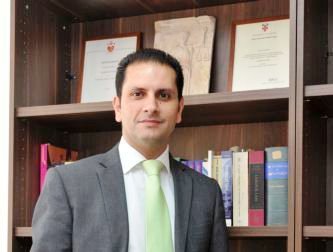
Speech by Aristos Damianou, Political Bureau member of AKEL, to the Conference organized by the Cyprus Trade Union of Semi-Governmental, Municipal and Communal Workers (SIDIKEK) of PEO on the effects of privatizations
AKEL C.C. Press Office, 23rd March 2017, Nicosia
First of all I would like to congratulate the trade union of SIDIKEK-PEO for the timeliness of the issue we shall be discussing, which becomes even more relevant after the very recent, but desperate attempt by the Anastasiades government to bring back the question of the privatization of the semi-governmental organization Cyprus Telecommunications Authority (CYTA-ΑΤΗΚ).
If I were to give the origin of the word “dogmatism” I would define it as the obsession to sell out to big private capital an organization which under difficult conditions records a profit of € 50 million per year and provides services to the people, even in the most remote village in Cyprus.
Since a big part of today’s speeches deal with the subject “the effects from privatizations” I have chosen to focus my intervention on the legal and institutional aspects of the issue, as well as on the actions and struggles we are waging together with the trade union movement, to prevent the privatization of semi-profitable organizations that are useful to society. I will make what is self-evident clear, namely that AKEL, besides taking preventative measures, is pursuing a second axis in its policy, that of promoting the consolidation and modernization of semi-governmental organizations as a prerequisite for the survival of both the Cyprus Telecommunications Authority (CYTA) and the Cyprus Electricity Authority (AHK).
From pledges made, to pledges broken
Dear friends,
I consider February 2011 as a reference point for the whole issue of privatizations, that is to say when the then presidential candidate Nicos Anastasiades proceeded to sign the following declaration with his own personal signature: “Our own position is very clear and is recorded with absolute clarity in the Framework Agreement signed between the Parties DISY and DIKO which constitutes the political foundation of our own candidature. Namely, that we are categorically against the privatization of the profitable semi-governmental organizations, the Cyprus Telecommunications Authority CYTA, Cyprus Electricity Authority AHK and the Cyprus Ports Authority ATHK.” This principal policy pledge that was made to the people ended up a broken political pledge and a deception in the most official manner, since through a series of actions, Mr. Anastasiades and his government are adamant on pursuing the privatization of CYTA.
More specifically:
- In March 2013 they turned their true political intentions for privatizations into a legal commitment of the Republic of Cyprus after the two Eurogroup meetings, through the drawing up of the Loan Agreement and the Memorandum of Understanding.
- In April 2013 the above were ratified with the Agreement on Financial Support Facility (Ratification) Law, N.1 (III)/2013, which explicitly states that “the Cypriot authorities will begin a plan for the privatization […] of semi-governmental organizations including, inter alia, CYTA, AHK and ATHK.”
- In March 2014 the Anastasiades government was particularly “productive” given that:
(I) The House of Representatives – with AKEL voting against – approved the Law regulating issues on Privatizations, N.28 (I)/2014, with references in the preamble such as “…through the privatization program significant benefits are to be expected” or “public interest is served better through the conversion of certain public bodies to a private legal entity.”
(Ii) The Ministerial Cabinet issued a Decree declaring as agencies/carriers subject to privatization the Cyprus Ports Authority (ALK), Cyprus Telecommunications Authority (CYTA), the Cyprus Stock Exchange (CSE), the Cyprus Electricity Authority (EAC) and the State Fairs Authority. (KDP 174-176/2014), while soon after the Troodos state properties (KDP 273/2015) were also included.
It was the period in which the Privatization Unit functioned as a state within a state, preventing the growth and development of CYTA and commissioning “expert studies” at the cost of millions of Euros on how privatizations could be made better.
The organized opposition of the working people and the change in the balance of forces in the House of Representatives has enabled us to reverse the dangerous course that was prescribed initially through the approval of a temporary ban on privatizations and last December to the rejection by a parliamentary majority of the funding for the operation of the Privatization Unit. Of course, even though the Unit’s functioning has been curbed, it continues to operate because of the votes of the other parties which approved relevant funds just a few days ago. For this purpose we have prepared a relevant draft bill with a view to completely abolishing the Privatization Unit. I should mention at this point that the informal proposal on the initiative of the President of the governing DISY party has been prepared to change the name of the Privatization Unit to the “State Property Management Unit”, a purely communication PR maneuver, if not to act as a distraction.
At the same time, in the new political environment and given that on this issue the government and the governing DISY party remained almost alone in the position they took in the House of Representatives, the Anastasiades government was forced to retreat and annul the most substantive privatization decrees. We have of course reached the point of the very recent development of the draft bill that was presented a few days ago.
Those who persist (don’t) win
On 19th March the Minister of Finance, in his letter addressed to CYTA, forwarded a draft Bill and Regulations transposing the commercial activities of CYTA to a private legal entity.
It is obvious that the chaos that was caused and the losses of millions of Euros accumulated by the privatization of the works/operations at the port of Limassol, have not brought the government to its senses. Quite the contrary, they are dogmatically insisting on pursuing a dead-end and damaging perspective, which we will oppose and struggle against.
Evidently neither did the negative prior examples in other countries discourage those who favoured this privatization (it wasn’t just the ruling party that voted for it). It’s enough for one to recall one of the most glaring examples of failed privatizations. That is, the example of British railways (British Rail) which was fully privatized in 1993. By 1999, 38 people were killed in accidents and over 600 injured, as a result of the reduced security checks, inadequate maintenance and poor management in the effort to make savings and increase profitability.
Coming back to the government draft bill this includes, inter alia, apart from the conversion to a private legal entity, the transfer by a Cabinet decree of commercial activities, assigning in the first year a minority stake to a private investor that will take over the management, while there is an attempt to “ease the pain” for employees, given that the truth is that the perpetuity of labour rights viewed as gains are not guaranteed. This is basically the same policy with a different mask since the philosophy does not change anything significant than the previous bill.
From its provisions, I distinguish as particularly dangerous for workers the conversion to a private legal entity. This is a matter about which both I myself and a number of other lawyers have given an expert opinion on in the recent past. Our basic position, which is maintained despite the secondary changes that were made to the draft bill, is that any labour rights, including that of permanence, are guaranteed as long as the organizations, in this case CYTA, will operate according to the existing institutional framework, that is to say in the realm of public law. If this framework is abolished, altered or tampered with as a whole or in part, the shield of protection disappears, as emanating and from Article 122 of the Constitution, which safeguards the public character of CYTA. On this specific point let me mention that in our persistent questions put to the Legal Service of the Republic within the context of exercising parliamentary scrutiny, as to whether with the original bills submitted the constitutional provision is violated, the reply that was given was that it is too early for a decision to be taken on this issue.
I recall that Article 122 of the Constitution states that “the term “public service” means any service under the Republic…and includes a service under the Cyprus Broadcasting Corporation (RIK), the Cyprus Inland Telecommunications Authority (CYTA)…” And the unconstitutionality of the Law on Regulating Denationalization Issues, N.28 (I)/2014 is evident since in this Law “public interest” is invoked as a reason for denationalization/privatization, at the same time as the Constitution again in Article 122 refers to “..any other public corporate or unincorporated body (in addition to CYTA, EAC and RIK) created in the public interest…” That is, the constitutional legislator considers that the public interest can only be safeguarded through the public character and not through the legal alchemies and constitutional violations that were made in the 2014 Act.
However, I must stress that in the case of privatization, the institutional consequences will have a knock-on effect, given that the decisions of the new private organization will not be able to be brought before the Board or an appeal launched before the Supreme Court. Therefore recruitment of personnel, transfers of staff, promotions and dismissals, but also bids will belong to the realm of private law. This fatally weakens the possibility of Parliament exercising political and parliamentary control.
A second illegal act and possible violation of the Constitution arises, as in the original bill as well, from the possibility of alienating the assets of the state and/or services through the issuing of decree by the Ministerial Council. Without expanding on the issue, permit me to point out the obvious. Namely that we have significant legal rulings/decisions and precedents in our arsenal that guarantees the permanence of the semi-governmental organizations despite the maze and final result of the draft bill’s questionable provisions, which AKEL of course rejects to strongly.
The real perspective
Dear friends,
There is no greater ideological obsession and dogmatism than the striking off of the € 700 million which CYTA returned in dividends and taxes to the state or the prescription, tabled in Parliament on 30th January 2017 during the discussion of CYTA’s 2017 Budget, for achieving a surplus after tax of € 59 million for the current year.
As the Chairman of the Board of CYTA declared, “CYTA is a robust, profitable organization, without loans and with investments that are made with the same capital. It has expertise, technical know-how, dedicated staff, excellent technological infrastructure, a strong international telecommunications network and a long-lasting relationship of trust with Cypriot society.”
As far as AKEL is concerned, we will not permit the sellout of this Organization to large private interests. The stakes for the economy of Cyprus, Cypriot society, for services, consumers and workers are far greater than serving selfish interests rooted in the obsession to privatize everything that is under public/state ownership





